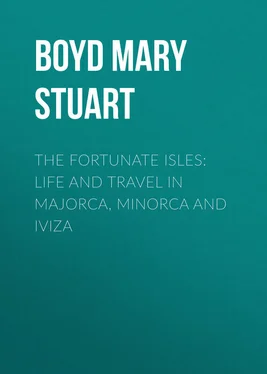Mary Boyd - The Fortunate Isles - Life and Travel in Majorca, Minorca and Iviza
Здесь есть возможность читать онлайн «Mary Boyd - The Fortunate Isles - Life and Travel in Majorca, Minorca and Iviza» — ознакомительный отрывок электронной книги совершенно бесплатно, а после прочтения отрывка купить полную версию. В некоторых случаях можно слушать аудио, скачать через торрент в формате fb2 и присутствует краткое содержание. ISBN: , Жанр: foreign_language, foreign_antique, foreign_prose, Путешествия и география, на английском языке. Описание произведения, (предисловие) а так же отзывы посетителей доступны на портале библиотеки ЛибКат.
- Название:The Fortunate Isles: Life and Travel in Majorca, Minorca and Iviza
- Автор:
- Жанр:
- Год:неизвестен
- ISBN:http://www.gutenberg.org/ebooks/39199
- Рейтинг книги:5 / 5. Голосов: 1
-
Избранное:Добавить в избранное
- Отзывы:
-
Ваша оценка:
- 100
- 1
- 2
- 3
- 4
- 5
The Fortunate Isles: Life and Travel in Majorca, Minorca and Iviza: краткое содержание, описание и аннотация
Предлагаем к чтению аннотацию, описание, краткое содержание или предисловие (зависит от того, что написал сам автор книги «The Fortunate Isles: Life and Travel in Majorca, Minorca and Iviza»). Если вы не нашли необходимую информацию о книге — напишите в комментариях, мы постараемся отыскать её.
The Fortunate Isles: Life and Travel in Majorca, Minorca and Iviza — читать онлайн ознакомительный отрывок
Ниже представлен текст книги, разбитый по страницам. Система сохранения места последней прочитанной страницы, позволяет с удобством читать онлайн бесплатно книгу «The Fortunate Isles: Life and Travel in Majorca, Minorca and Iviza», без необходимости каждый раз заново искать на чём Вы остановились. Поставьте закладку, и сможете в любой момент перейти на страницу, на которой закончили чтение.
Интервал:
Закладка:
So, in quest of a compatriot whom we couldn't miss, we set off up the street. And sure enough, before we had proceeded very far we met the captain face to face.
If the captain of the Ancona was surprised at being accosted by a trio of complete strangers, he was too much a Highland gentleman and a man of the world to reveal any astonishment. In five minutes we were all on a friendly footing, our nationality the firm basis of good-fellowship; a little later we were all seated outside the Lirico, over tall glasses of vermouth and seltzer, recalling familiar scenes and discovering mutual acquaintances.
The captain was at a loose end. We were going to the fruit market, to the bookseller's, to the Cathedral. So he came too.
In the market, as he saw me buy big bunches of yellow grapes at twopence-halfpenny a kilo (nearly two and a quarter pounds) his face lit up – "I'll be for sending the steward up here," he said.
Chance favoured us. We turned into the Borne just in time to see an infantry battalion march past to the strains of a good military band. A general had died and the soldiers were on their way to escort his body to the cemetery. The music, which was appropriately solemn, was played with great feeling. And as the procession moved slowly up the street the closed window shutters were thrown open and fair señoras in light dresses thronged the balconies.
It was as though Palma had determined to reveal herself at her best to our companion. Even the interior of the Cathedral, lit by the brilliant sunshine that filtered through the stained-glass windows, seemed grander than ever.
"I've had a splendid time," the captain said when we parted. "Though I've been here two or three times, I never saw so much of the town before."
We were leaving next morning for Miramar, and before our return the Ancona would have sailed. But we said good-bye with the promise of meeting again – a promise that was fulfilled, for on two subsequent voyages the captain was a welcome guest at the Casa Tranquila.
"The captain is a gentleman," the Boy said half-a-dozen hours later when he returned from the ship, where, by special invitation, he had been having a smoke and a chat with her master. "See what he insisted on giving me. I refused, of course, but he made me take that and this ."
"That" was a batch of thrice precious literature in the shape of sixpenny editions of novels and magazines. "This" was a tin of tobacco marked "full strength," that class of dark-complexioned rum-odorous tobacco that the Boy specially affects, and whose lack in Majorca had formed the theme of his only regret.
Life on the native craft in the port is entertaining to watch. The dark-skinned rovers of the deep contrast so oddly with the mildly domestic aspect given by the presence on board of the patrón's wife, and by her way of keeping hens loose on deck, and of hanging feminine garments to dry on the poop.
One Sunday morning we had been scrutinizing their doings with the open stare that life in Spain teaches one both to give and to take composedly, when we discovered that luncheon-time had stolen unawares upon us. As we walked back down the pier we glanced inquiringly at the cafés that lined the lower part of the way; they were all crowded with jovial seamen and uninviting. We had resolved to eat at the Lirico, and were leaving the pier, when something in the situation of a little open-air eating-place just on the brink of the sea, almost in the shadow of the city wall, attracted us; and advancing to the awning, under which little groups of people were seated, we demanded food.
The proprietress, a plump, smiling woman with a purple silk kerchief on her head and a green apron, welcomed us in fluent but, unfortunately, unintelligible Majorcan. She knew no Spanish. All we could gather was that if we seated ourselves she would give us to eat. And nothing loth, we sat down at an unoccupied table whose bare boards were scrubbed as clean as hands could make them.
Beyond the shade of the roof-awning the sun was shining; the pure air filtered through its matting sides, and in our full view the waves were dashing against the rocky shore. At a table close by, three old cronies were dining. Scorning the use of tumblers, they passed the quaint wine-flask from hand to hand, each in turn throwing back his head and letting the red wine fall in a stream, from what to us seemed an unbridgeable distance, between his parted lips. Four soldiers were eating macaroni. Two men who had been fishing off the breakwater were supping thick soup.
A pretty little girl, her hair caught up in a business-like "bun," darted in and out amongst her mother's customers, her dark eyes quick to discern their wants. From inside the shanty that served as kitchen came an appetizing sound of frizzling.
Turning her attention to us, the little girl put the inevitable dish of olives and a flask of red wine on the table; then she placed a wooden fork and spoon, a plate, a tumbler, and a roll, before each of us. Then, with the suggestion of an air of ceremony, she carefully laid at the Man's right hand something resembling a folded piece of clean canvas. It was not until the meal was nearing a conclusion that we discovered it was intended to be used as a napkin.
The table thus spread, she darted into the kitchen and returned bearing a huge flat earthen dish, which held as inviting a mess as we had ever tasted. The main portion of its contents consisted of small thin slices of beef-steak, mushrooms, and strips of potatoes that had all been fried together, after the native fashion, in boiling oil. Daintily chopped green herbs lent a savoury garnish to the whole. After a momentary hesitation, due solely to lack of the customary cutlery, we helped each other with our wooden spoons, and fell to work with good will.
Perhaps there was some charm in the oddity of our surroundings, in the fresh breath of the sea air, in the sparkle of the blue water; perhaps it may have lain in the discovery that if meat is tender and well-cooked, a fork – and wooden at that – is all the implement required. Certain it is that as we cleared the last chip of potato from the earthen dish we all agreed that we had enjoyed the simple meal more than anything we had eaten in Palma.
When we asked for the bill our little waitress received the sign of departure with dismay; and the mother, running out, added her protest. Something else was evidently in active preparation.
Fully convinced that to eat anything more would be an insult to the dish we had just finished, we waited.
A moment later she triumphantly carried out and set before us a plate containing a slab of fish, thickly covered with minced garlic and floating in a pool of rich red oil. It may have been a delicacy for which the establishment was famed. Our fellow guests were devouring it with evident enjoyment, zealously sopping up the oil with their rolls, and leaving their plates polished clean. But to us it came as an anti-climax.
Carefully inculcated politeness, combined with the knowledge that from the doorway the cook was eagerly watching us for sign of appreciation, induced us to choke it down with an outward affectation of gusto. But we left the garlic and the red oil. Even an exaggerated idea of the obligations of courtesy could not have prevailed upon us to swallow them.
We paid the modest bill and fled, lest worse should follow.
A few days later we returned to the quaint open-air café. It was a lovely evening early in November. All day out of a cloudless sky the sun had beat warmly upon Palma, and the sea had glowed a soft misty azure. We had been busy indoors letter-writing, for it was a mail day. It was only after dusk that we were free and, leaving the Casa Tranquila, set off port-wards to post our letters.
The Miramar , the crack ship of the Isleña Marítima , was on the point of starting for Barcelona, and all the world of Palma was hastening towards the harbour to post letters on board; and then, while promenading the mole, to watch her departure.
Читать дальшеИнтервал:
Закладка:
Похожие книги на «The Fortunate Isles: Life and Travel in Majorca, Minorca and Iviza»
Представляем Вашему вниманию похожие книги на «The Fortunate Isles: Life and Travel in Majorca, Minorca and Iviza» списком для выбора. Мы отобрали схожую по названию и смыслу литературу в надежде предоставить читателям больше вариантов отыскать новые, интересные, ещё непрочитанные произведения.
Обсуждение, отзывы о книге «The Fortunate Isles: Life and Travel in Majorca, Minorca and Iviza» и просто собственные мнения читателей. Оставьте ваши комментарии, напишите, что Вы думаете о произведении, его смысле или главных героях. Укажите что конкретно понравилось, а что нет, и почему Вы так считаете.











![John Bruce - The Lettsomian Lectures on Diseases and Disorders of the Heart and Arteries in Middle and Advanced Life [1900-1901]](/books/749387/john-bruce-the-lettsomian-lectures-on-diseases-and-disorders-of-the-heart-and-arteries-in-middle-and-advanced-life-1900-1901-thumb.webp)
